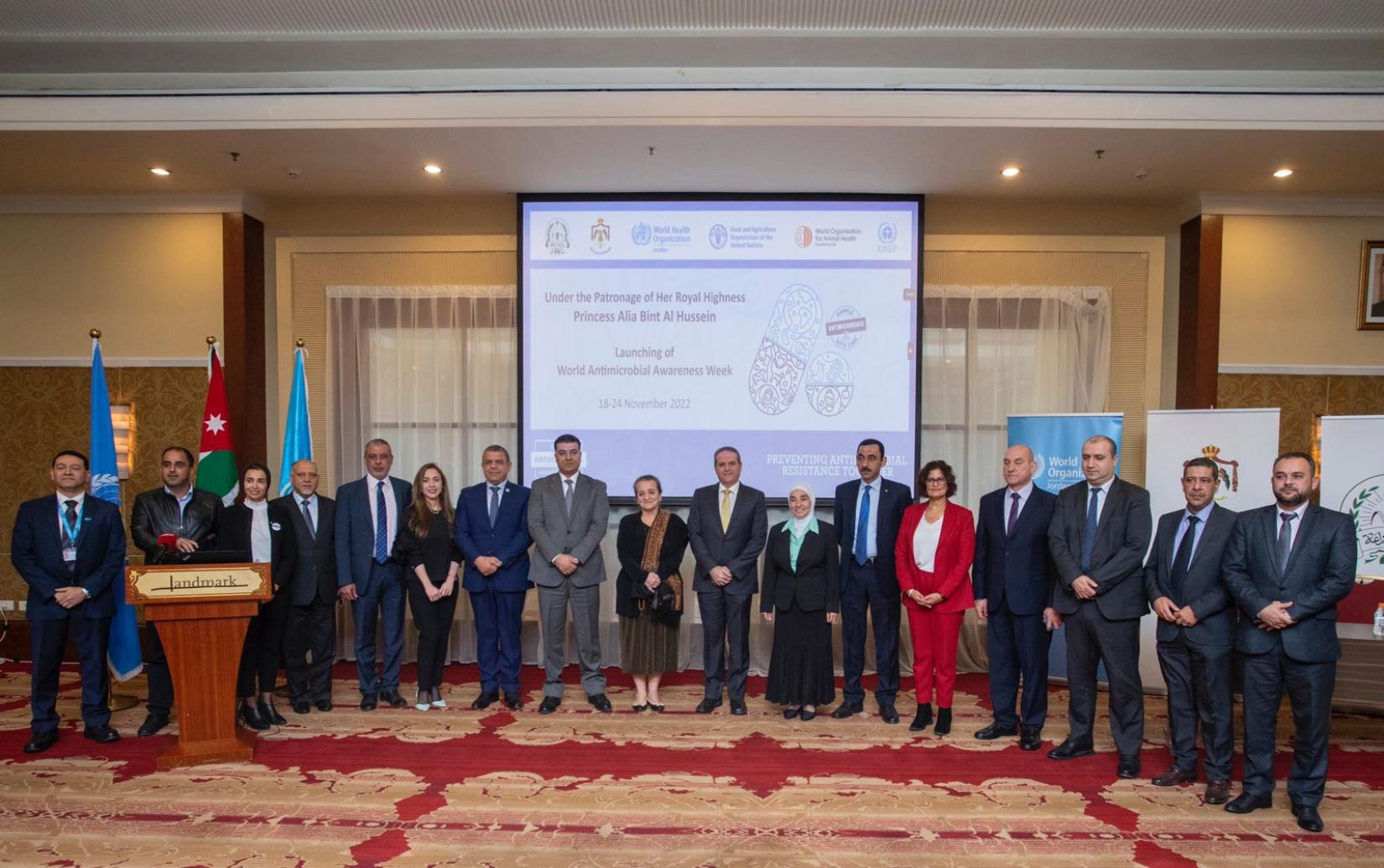Under the Patronage of Her Royal Highness Princess Alia Bint Alhussien - Launching of World Antimicrobial Awareness Week 18 - 24 November 2022
20 November 2022

Amman - Jordan is commemorating, along with the rest of the world, the World Antimicrobial Awareness Week (WAAW) under this year’s theme, “Preventing antimicrobial resistance together.” WAAW is an annual global campaign to raise awareness and understanding of antimicrobial resistance (AMR) and to promote best practices among One Health stakeholders to reduce the emergence and spread of drug-resistant pathogens.
High rates of antimicrobial resistance have been reported in countries at all income levels. The result is that common diseases are becoming increasingly untreatable, and lifesaving medical procedures riskier to perform.
Because the drivers of antimicrobial resistance lie in humans, animals, plants, food and the environment, a sustained One Health response is essential to engage and unite all stakeholders around a shared vision and goals. WHO Country Office in Jordan, in collaboration with the Offices of the Food and Agriculture Organization of the United Nations (FAO) and World Organization for Animal Health (WOAH), are assisting Jordan in the implementation of your plans through the “One Health AMR” approach.
Under the patronage of Her Royal Highness Princess Alia Bint Al Hussein, Ministries of Health and Agriculture, in collaboration with the World Health Organization (WHO) and the Food and Agricultural Organization of the United Nations (FAO), held a high-level meeting with key stakeholders to renew joint support for AMR and ways to raise public awareness of the phenomenon.
During the event, His Excellency the Minister of Agriculture, Eng. Khaled Hanifat, said, "I am pleased to enhance the cooperation between the Ministry of Agriculture and the Ministry of Health, as today a memorandum of understanding will be signed between the Ministries of Health and Agriculture to join hands in confronting zoonotic diseases." H.E explained the main role of the Ministry of Agriculture in combating the growing threat of antimicrobial resistance, as it works to encourage the wise use and management of antimicrobial products in animals, monitor veterinary medicines in terms of their manufacture and import, monitor the type and use of antimicrobial products in animals, and also works to raise awareness among farmers. Furthermore, encouraging the application of international standards to avoid the risk of antimicrobial resistance.
The Minister of Health, H.E. Dr Firas Al-Hawari, emphasized that Jordan has taken several steps to address the global challenge of antimicrobial resistance. Jordan has joined the Global Antimicrobial Resistance Surveillance System (GLASS) since 2018 and established its national antimicrobial resistance surveillance system.
The Minister added that despite the achievements that have been made, there are still lots of required efforts to confront this threat in Jordan. This could be through awareness raising; taken actions by the concerned parties; implementing new measures and tools to maintain the balance between access to antimicrobials when needed and rationalize their use and stewardship in human, animal and food sectors.
His Excellency explained that the Ministry of Health aims to strengthen collaboration across sectors and civil society to combat antimicrobial resistance. This includes coordination with ministries of Agriculture, Environment, Water and Irrigation in addition to Jordan Center for Disease Control, Jordan Food and Drug Administration, Royal Medical Services and other governmental and societal organizations.
H.E appreciated the role of the World Health Organization, the Food and Agriculture Organization of the United Nations, the World Organization for Animal Health, and the United Nations Environment Program in supporting Jordan's efforts to address the threat of antimicrobial resistance using the "One Health Approach", and their technical support to Jordanian ministries and institutions to reduce the burden of this phenomenon locally and address it better.
The FAO Representative to Jordan Eng Nabil Assaf said “Antimicrobial resistance requires a One Health approach and combines effort of human and animal health sectors to achieve a paradigm change in antimicrobial use is a major priority for FAO and that is why we are here together today.” He added, “Antimicrobial Resistance – is a global threat and the consequences of antimicrobial resistance include the failure to successfully treat infections, leading to increased mortality; more severe or prolonged illness; production losses; and reduced livelihoods and food security. It is the role of everyone to Spread Awareness, Stop Resistance.”
On her side WHO Representative to Jordan Dr Jamela Al Raiby stressed that “The challenge of addressing the threat of antimicrobial resistance is real, is urgent, and it affects us all. That is why this year’s theme calls for cross-sectoral collaboration to preserve the efficacy of these important products.”
WAAW derives its importance from the fact that it brings together various sectors and aims to prevent antimicrobial resistance by raising awareness for the entire population. The challenges of AMR are complex and multifaceted which is why WHO and FAO will continue to call for a multisectoral approach to addressing the phenomenon and increased collaboration to raise awareness of AMR among the public and key stakeholders to collectively combat AMR in Jordan.
During the meeting, Ministry of Health and Ministry of Agriculture signed a protocol to collaborate on One Health and fighting Zoonotic diseases and antimicrobial resistance. After the meeting, joint workshop and simulation exercise for strengthening diseases surveillance, and information sharing at the human animal interface have started.


